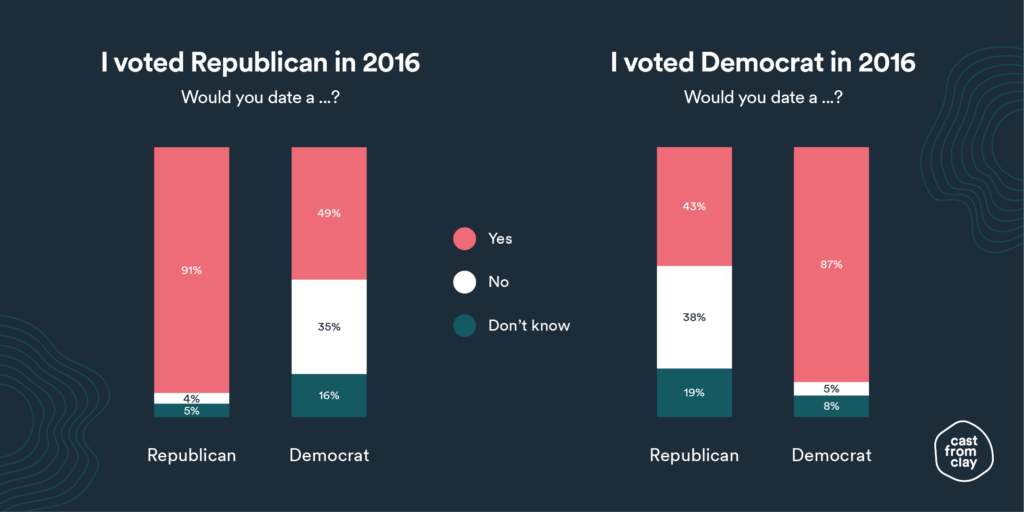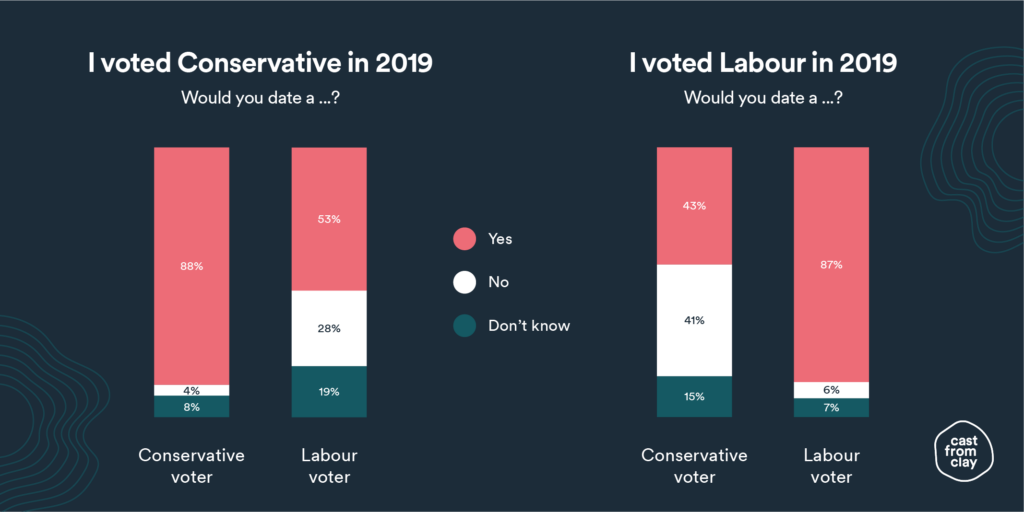
A little while ago I read two different articles containing almost identical statements:
“You want to change the other? You change you.”
“I learned a long time ago that it is very hard to change other people, and it is much easier to change yourself.”
The first is by renowned psychotherapist Esther Perel. The second is technology ethicist Alice Thwaite. Perel was writing about the challenges couples face when cohabiting during lockdown, Thwaite about political polarisation.
The timing caught me because of some recent research we did here at Cast From Clay.
As many societies around the world reveal a growing sense of polarisation (in the US, for example, partisan antipathy is deeper and more extensive than at any point in the last two decades), we wanted to know how extensively this polarisation is present within our private lives. We asked more than a thousand people whether they would date across partisan lines. The results will likely not surprise you: a good share of us do not.


Perhaps the short answer to “why not?” is: relationships are hard enough without having an evening meal turn into an episode of Newsnight or, ahem, a Presidential Debate.
A sense of trust and safety is vital in relationships, and maybe that’s something many feel we can’t reach when we have political differences.
The personal is political, etc etc, and much like the cohabiting couples in Perel’s article, all of us are locked down on planet Earth together, trying to muddle through – ideally without causing each other misery.
So, what can we learn from healthy relationships that we can apply to our political liaisons?
UK-based relationships charity Relate says: “Conflicts are part of any relationship, but there are ways to make things easier.” They’re not saying don’t argue – just argue better.
Their advice for how to argue ‘well’ could help us all in our politics:
“Don’t expect the other person to be a mind reader”
Or, in communications terms – don’t use your frames, use theirs.
Our beliefs and values are almost second nature because they form the fabric of our reality. That’s why it’s so baffling when you meet someone who just doesn’t see things the way you do. And why, no matter how much you explain to them, they still don’t agree with you.
When we’re using different symbols as currency, no exchange can occur.
In other words:
“Your responsibility as a human being is to try and understand others on their terms, not just on your terms” – Malcolm Gladwell
Sign up to our newsletter
Many of us pride ourselves on our integrity, meaning it can be really difficult to even entertain perspectives that lie in direct opposition to what we believe to be right.
But finding a shared value is what it takes to move forward.
“Don’t dredge up the past”
“It can be easy to hang on to resentment,” the video says.
No kidding.
Again and again things fall along the same partisan lines. Here in the UK it goes…
Labour: Tories are greedy and evil
Conservatives: Labour are incompetent idealists
And round and round we go until one by one we age and we die.
I’m not saying we take a rose-tinted view of one another, and hold hands singing. But when we define each other by our worst selves, our worst selves flourish. If we stop raking over each other’s trash long enough to listen, we leave space for other possibilities to emerge.
“Take a break”
“Sometimes arguments spin out of control, but when you’re both just scoring points and nobody’s listening to anyone you’re not likely to get anywhere.”
“Sometimes”?
Lucrative careers are made on public political arguments. Our platforms reward outrage. This creates a centrifugal force, catching us all up, dragging us down, getting faster and more furious the farther in we go.
Stepping away really helps. I don’t mean disengage completely. Maybe it’s giving ourselves more time to decide what we think and how best to express it. Maybe it’s just speaking to people we disagree with face to face, without an audience, without a personal brand to curate. We may find we don’t actually disagree as much as we think we do.
It can be difficult if we’ve formed all our social groups based on similar political leanings. So maybe it’s time to go and meet up with a stranger – I heard there’s an app for that?





